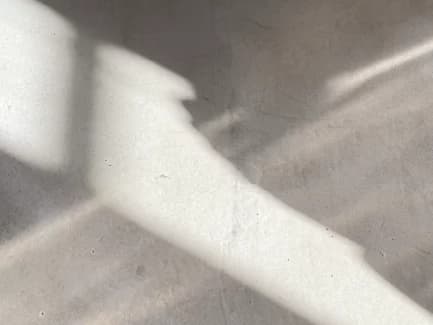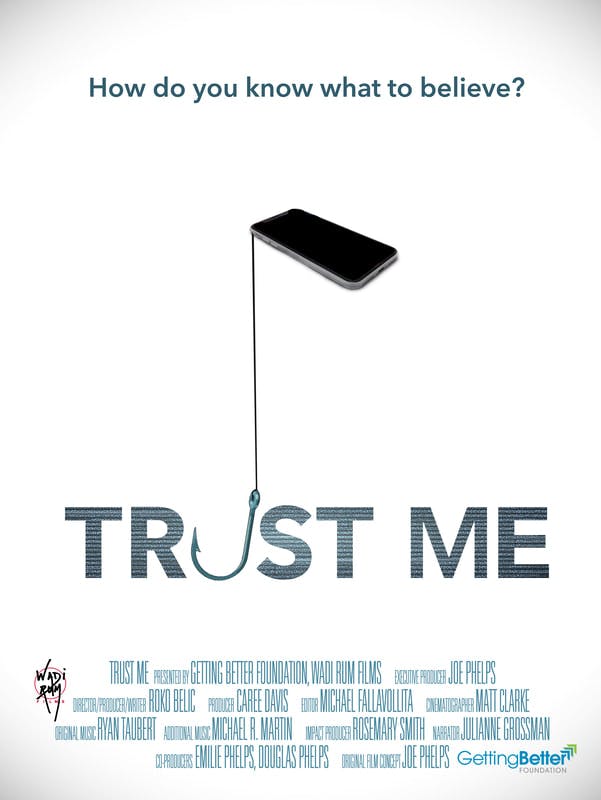
Bailey Johnson
Creative Director
Executive
Web Designer
Art Director
Product Designer
Illustrator
Typeface Designer
Graphic Designer

From Feynman to Genghis Blues - How Curiosity Leads to Great Films
When I was around seven, the knob on the family TV broke off and mom used a pair of vice grips to set the channel to the local PBS station. I grew up watching tons of documentaries about subjects from black holes to leper colonies to Tuvan throat-singing. Also, my parents were foreign (mom from Czechoslovakia and dad from Yugoslavia), and I grew up knowing there was a bigger world out there.
On a rainy day when I was about six, I was at a friend's house. My friend's mom saw that we were bored, so she gave us the family's Super 8 movie camera and suggested we make a film. My friend knew the concept of stop motion cinematography already at age seven, so we shot some stuff with a toothbrush, toothpaste, and a figure we made out of clay. A couple of weeks later, after the film had been processed and my friend projected it on the wall, I was stunned. We did that? I wanted to do it again and again.

Genghis Blues happened because of my mom and a lot of good luck. One day when I was in high school, our only working TV was in Mom's room, and she called me in to watch TV. I told her I had to write a paper for school, but she insisted I watch this documentary. It was about the eccentric Nobel Prize-winning physicist, Richard Feynman, and his lifelong curiosity about a little-known place in the geographical center of Asia called Tannu Tuva. Despite the fact that Feynman was a scientist, and I'd watched plenty of science programs featuring people like Carl Sagan, Marie Curie, and Albert Einstein, this was no science documentary. It was about Feynman's fascination with this extremely remote region where nomadic descendants of Genghis Khan still dressed in long robes and pointy boots and hats, practiced shamanism and sang three notes at the same time. When I learned that Feynman died before fulfilling his dream of visiting Tannu Tuva, I vowed I would get there.
A few years later, when I was graduating from college, I tracked down a friend of Feynman's who I had seen in the documentary. Ralph Leighton seemed to be the only living person who knew anything about Tannu Tuva. This was the mid-1990s, pre-internet. I called Leighton and told him of my plans to go to Tannu Tuva - possibly as an add-on to an upcoming trip where I was going to visit relatives in Eastern Europe - and if I made it, I'd likely have a video camera with me to document whatever I could.
Leighton told me about a blind blues musician living in San Francisco who had learned the traditional Tuvan way of multi-harmonic singing and was planning to travel to Tuva for a singing competition the following summer. His name was Paul Pena, and he'd played with the greats like John Lee Hooker, Bonnie Raitt, and B.B. King. Leighton said his friend at the B.B.C. couldn't document Pena's upcoming trip - and I realized he was referring to the filmmaker who'd made the documentary that had inspired me in the first place - and suggested that maybe I could film it. The idea of following a master bluesman to an extremely remote and fascinating part of Asia to make a movie was better than anything I could have imagined. I wanted to scream YES!!! into the phone, but instead pretended I needed to "check my schedule" and I'd get back to him. After I hung up it's kind of a blur. I zipped through family visits in Croatia and the Czech Republic and got to Moscow as quickly as I could. I bought a ticket on the Trans-Siberian railway and headed for central Asia. By chance, I'd studied the Russian language in college which helped me evade security officials who prowled the trains. A rarely-granted special visa was required to travel to Tuva, even for Russians, and I didn't have it. Technically, I wasn't supposed to leave Moscow.
A week later I arrived in Tuva, in the middle of winter, in the middle of the night, with nothing but a phone number I'd scribbled during a phone call with Leighton. Fortunately, there was a pay phone in the snowy, vacant lot where the bus driver had left me. The man who picked up the other end of the line, I later learned, was Tuva's greatest living singer, Kongar-ol Ondar.
Despite some frostbite on my nose and ears (it was minus 50 degrees Celsius), it was a successful trip. I made connections for places to stay (apartment couches and floors) and support for when I'd return a few months later with a rag-tag crew to film Genghis Blues.
When I realize I'm changing things and not making it better, just different, then I know I'm getting close.
When choosing a film to make, if I think: "This is what I want to do for as long as it takes to get it done," then I do it. I don't think about it very strategically. It has to just "be" the thing I want to do. If it's selecting a story or character for a film I'm already making, then it has to be the most compelling option I have.
Staying sensitive is the key.
I take note of my first response to a story, a clip, a sequence, or an element of the movie. If my initial response was to be very moved by it, then it should be in the final film if at all possible - if it doesn't conflict and isn't redundant with something else in the film.
And I rely on outside eyes, but most people don't know how to fix a film. You have to read between the lines. If they don't like a scene, it might be because of what happens immediately before or after that scene. Or it might be because the music is forced, on point when it would be a better counterpoint, or just too loud or soft.
Time away from the editing room is critical. No matter what, when I've had some distance, usually a couple of weeks if not a couple of months and I look at my cut again, I want to change something. And this isn't trivial stuff, this is still making the film better.
When I realize I'm changing things and not making them better, just different, then I know I'm getting close. Then I have to re-evaluate all the material and make sure I have the best film possible.
I love co-editing my films because it helps me understand what the movie can be, but I rely on my editor tremendously. Both Vivien Hillgrove, who edited HAPPY, and Michael Fallavollita, who edited DREAMS, THE BATMOBILE, and TRUST ME are very intuitive editors. They feel things I'm not sensitive enough to pick up, and they're almost always right.
Though I dislike the experience of getting notes (you want me to cut that scene I spent 6 months editing?!), it's extremely helpful. I'm shaping the film based on what moves me, but I want a lot more people than me to appreciate it, so it's very important to understand how the film plays for other people. In many ways, the director is the worst person to judge the film and its elements, because he or she is the only one who sees the film the way s/he does, with all the behind-the-scenes experiences and emotional baggage attached to so many tiny details that no one else is privy to. And yet the director's taste or vision must drive the creation. The goal every time is to make the greatest movie possible.
Every step is a challenge from starting the film to ... eternity (so far) because even long after a film is done there's work to be done. I just recently completed an audio description for the visually impaired for my 24-year-old, first film.
Initially, you face the challenge of how to present the idea you have for a movie with words and images. Then you have to decide what to film, how and when to film it, with what camera(s), lens(es), and with whom and where. You have to figure out how and where you'll eat and sleep while you make the film, where you'll do post-production, and on what equipment. Every step is a challenge, and I think that's why most people who think they want to make films never do. But if you like solving problems and overcoming obstacles, it's a perfect playing field, because problems and obstacles keep coming. Sometimes it's tedious as hell and sometimes it's euphoric.
In terms of concrete challenges and obstacles, we've had to dig ourselves out of 3 feet of mud on a mountain in Siberia, chase down a thief who was running off with my gear at a religious festival, keep steady while filming handheld and covered in mosquitos in a malaria-infested part of India.
This is a VERY incomplete list:
MOVIES
Star Wars (1977), Raiders of the Lost Ark, Planet of the Apes (1968), Last Journey of a Genius, Ring of Fire (Blair Bros. 1988), Don't Look Now, Thin Red Line, American Movie, Seven Samurai, Blade Runner, The Man Who Would Be King, James Bond films, Lawrence of Arabia, The Killing Fields, Sophie's Choice, A Woman Under the Influence, The Act of Killing, Memento, Inception, The Fighter
BOOKS
Seven Years in Tibet, Be Here Now, Adrift, Into the Wild
PEOPLE
Mahatma Gandhi, Martin Luther King Jr., Mother Teresa, Jane Goodall, Jacques Cousteau, Dan Eldon, Banksy, Sir Edmund Hilary and Tenzing Norgay, my Mom, my Dad
EVENTS
Apollo 11 lunar mission, the 1988 Tiananmen Square protest, the fall of the Berlin Wall
SONGS
Imagine
More people think documentaries are cool now than when I made my first one. Back then it was like "Why are you making a documentary? You should make a real movie."
The best advice I've ever received about filmmaking is "Do it!"
The worst advice came from a couple I didn't know, to who I showed my first movie. Up to that point, only a few friends and family had seen Genghis Blues. The movie follows a blues musician who travels to Asia for a competition in a very unusual form of singing. The couple said essentially 'It's pretty good, but I don't know why the musician is in it. You could cut him out.'
I'm working on my first narrative feature film, LŪN (working title), based on a true story, about a man who rows a boat across the Atlantic Ocean, upending the lives of the people he loves.